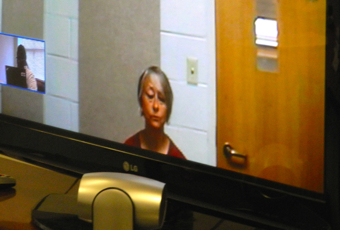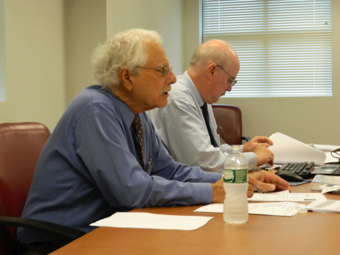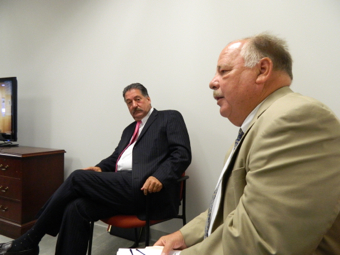 Nearly two years after being sent to prison for stealing hundreds of thousands of dollars in taxpayer money, the questions for former Oxford Tax Collector Karen Guillet were the same.
Nearly two years after being sent to prison for stealing hundreds of thousands of dollars in taxpayer money, the questions for former Oxford Tax Collector Karen Guillet were the same.
Why?
Was it to feed a gambling addiction? Buy drugs? Was she struggling to pay her bills?
No, Guillet told members of the state’s Board of Pardons and Paroles Wednesday. “Just total greed.”
The board questioned Guillet for about 30 minutes as to whether to release her from prison early, but it took just three minutes of deliberation for the board to say “no.”
“All right Ms. Guillet, you’ve been denied, you’ll do your full sentence,” said parole board member Robert Murphy, a former FBI agent. “We wish you the best of luck.”
Background On The Case
In November 2012, Judge Richard Arnold sentenced Guillet to a 12-year prison sentence to be suspended after she serves four years behind bars. She’ll be on probation for five years after she is released.
The sentencing marked the culmination of a public corruption scandal that was first alleged in December 2009, when Oxford Town Hall officials began to probe the tax collector’s office.
According to a state police arrest warrant, Guillet was stealing money and cooking the books in Oxford to pay for spa treatments, dog walkers, spending sprees at posh stores —- and weekly deliveries of fresh flowers to her home.
Click here to learn more about the allegations.
She dropped thousands in stores such as Neiman Marcus, Saks Fifth Avenue, Lord & Taylor and Williams Sonoma. Her spending habits were widely known among her co-workers in Oxford Town Hall, but Guillet attributed her wealth to a trust fund or her husband’s construction company.
Guillet’s lapping scheme was finally unraveled when Sharon Scinto, then Guillet’s assistant, noticed discrepancies with cash receipts and began asking questions. Guillet was arrested in late 2011.
‘The Only Thing I Have To Offer’
By law, any offender sentenced to more than two years and a day in prison is eligible to be considered for parole.
Murphy and fellow parole board member David May, a former correction officer, heard Guillet’s case Wednesday from the “Rowland State Government Center” in Waterbury, a building named after the family of Connecticut’s corrupt former governor, John Rowland.
Although Guillet made a lengthy statement to the court before being sent to prison, Wednesday’s parole hearing was the first time she answered questions about her crime.
The parole board began by asking Guillet, who participated via closed-circuit television from York Correctional Institution in Niantic, why she thinks she should be released early.
Guillet said that when she first arrived in prison, she was “very beaten down.”
“I had a lot of guilt and remorse inside of me, which I had hoped would go away,” Guillet told the parole board. “Unfortunately it has not. I have not forgiven myself so it’s very hard for me to move on. However, I’ve found that by helping other people in here, I was able to at least see myself in a different light.”
Guillet said she has helped other prisoners study for GED tests and write college application essays. She’s also helped other inmates write sentence modification requests, she said.
“That is the only thing I have to offer, is to help anybody,” she said. “I cannot go back and undo the things that I’ve done. I still hear Mr. Temple, I still hear the prosecutor and the judge. And the shame that I felt for what I’ve done to the town, because I think I committed the most heinous of crimes, and that’s the betrayal of trust. I lost that trust with my family and I lost it with the town.”
Guillet told the parole board she wants to return to Oxford.
“I hope that I would be able to come back to the town at some point and stand in front of them and say that I know what I’ve done was a heinous thing to do, but right now I cannot go back,” she said. “I have to move forward. And whatever the good people of the town feel, along with Mr. Temple … I will stick by their decision and whatever they have to say about me, because I deserve it and much more.”
 ‘I Just Wanted More Than What I Have’
‘I Just Wanted More Than What I Have’
After Guillet’s statement, Murphy and May questioned her for about 15 minutes.
May pointed out that she has taken some programs behind bars, but not any programs on her “offender accountability plan” prepared by the state’s Correction Department.
Guillet said she was on waiting lists to participate in other programs.
She said she works seven days a week in the prison gymnasium and has taken a 12-step program to treat what she called an “addiction to money.”
She said she’s also taken stress management classes and completed the Correction Department’s “START NOW” program, which is designed to treat offenders with behavioral disorders.
She said she’s received one “disciplinary referral” while behind bars. She told Murphy and May she was working in the prison laundry and other inmates were joking with her about how much weight she lost since being jailed.
She said she playfully stuffed a pillowcase under her uniform to show them how she used to look and was suspected of trying to steal it, but wasn’t given any punishment for the incident.
May suggested Guillet take some programs focusing on relapse prevention and victim impact. “You’ve got a lot of victims in your case.”
“This was a huge amount of money, I don’t need to tell you that,” he said. “Do you really think based on the magnitude of this crime that you’re deserving of your earliest parole consideration? You’ve done less than two years.”
Guillet replied that she was surprised herself when she was told she was being considered for early release.
“I’m leaving that up to you good people to decide for me,” Guillet said. “As far as I am concerned right now, I deserve whatever is given to me by the board.”
He also asked her what she meant by being “beaten down.”
Guillet said that the opprobrium she felt from the rest of the town’s residents made her feel “totally worthless, without any humanity left in me.”
“I think that shows that people were extremely upset, and rightfully so,” May said.
He also tried to get to the bottom of why Guillet stole.
It was a question that baffled even Judge Arnold before he handed down Guillet’s sentence in the criminal case.
Article continues after video of the judge speaking at Guillet’s sentencing.
“You embezzled a huge amount of money, and you don’t have a gambling problem … you’re not a substance abuser, not that that would justify it, but it would at least give me some reason,” May said. “I mean, why did you do this?”
Guillet said there was no reason. She had a good job, and her husband ran a successful business.
“I think it was just total greed,” she said. “I took the money, I spent it myself, I spent it on other people. I don’t know, maybe because it was easy — the money was there. But it was total greed. That’s all I can come up with. I just wanted more than what I have.”
“I don’t know why I felt I needed more, but that’s all I could tell you,” she said later. “I just wanted more things, more things that I couldn’t buy with what I have. I perhaps wanted to feel that I was better than everybody else.”
May also pointed out that Guillet still owes about $140,000 in restitution to the town.
“So how are you going to resolve that?” he asked.
“The only thing I can do is get a job somewhere. I’ll get Social Security as well, and I’ll give back as much as I can for the rest of my life,” she said. “That’s all I can do.”
“What does the future hold for you?” May asked next. “What’s your life going to look like?”
Guillet said she wants to return to stay with her family in Oxford. “And work. I want so much for the people in the town to know how sorry I am, because I don’t intend on moving away.”
She listed her husband as a sponsor for her parole, May said, but Guillet said only her sons and friends visit her.
“If you’re not communicating with your husband, what makes you think or so sure that this in fact is going be a solid arrangement?” May asked.
“I would have to believe that it will be for the time being,” she replied.
May said the plan sounded “tenuous.”
Murphy pointed out that her husband filed for divorce while the criminal case against her was pending.
Guillet said the filing was “rescinded.”
May asked her what she’s learned behind bars.
“I think I’ve come to realize that I’m not the first person in line anymore, that materialism is probably the worst case scenario,” Guillet replied. “I’ve seen people who are happy with absolutely nothing. I’ve seen people trying to pull themselves up. I’ve also seen horror in this place. But I believe that being here it showed me that I am not better than anybody else.”
“When did this all begin with you?” Murphy asked her. “When did you start taking money?”
Maybe the end of 2006, Guillet replied as Temple shook his head and sighed in disagreement.
“Didn’t your husband and your grown children wonder where this extra money was coming from?” Murphy asked her.
“No one ever approached me,” Guillet said, though she said her husband was critical of her spending habits.
Murphy seemed incredulous.
“They knew what your salary was, they knew that you were living above your means, they had to know that,” he said.
 Temple Weighs In
Temple Weighs In
Murphy then asked for victim input from Temple.
The first selectman said that Murphy’s central question — why did you steal the money? — “hit the nail on the head.”
“Many people in my town are scratching their heads and they say ‘Why,’” Temple said. “Every time you see something like this where there’s a very large embezzlement, there’s usually a reason for it.”
“We all look for some sort of justification,” Temple said.” And none of us can find that justification, other than the fact that apparently Ms. Guillet enjoyed the attention that she got … from demonstrating her wealth.”
Guillet sat with her head bowed as Temple spoke.
Temple also disagreed with Guillet’s statement that she began stealing taxpayer money in 2006.
“I believe this has been going back much longer than Ms. Guillet put on,” Temple said. “I believe that it’s been going on for over 20 years.”
“The amount that she has been convicted of was the amount that the state brought. The state wanted an open-and-shut case, as soon as they proved first-degree larceny, they didn’t care about anything else,” Temple said.
He went on to read a prepared statement that said town officials have estimated Guillet’s theft at more than $4 million.
Click here to read Temple’s prepared statement in its entirety.
Releasing Guillet so soon would be “a slap on the wrist for her and a slap in the face for Oxford,” Temple, who also handed the parole board a petition with more than 500 residents’ signatures opposed to Guillet’s release, said during Wednesday’s hearing.
 Denial, Reaction
Denial, Reaction
After deliberating behind closed doors for all of three minutes, Murphy and May agreed with Temple.
Citing “injury and impact to the victims” and the “nature and circumstances” of her offense, Murphy and May voted to deny Guillet’s parole bid.
Guillet took it well. “Thank you sir, I appreciate your time,” she said.
Outside the hearing room, Temple said he was pleasantly surprised by the parole board’s ruling.
“They (usually) put a very high premium on what kind of a prisoner they are,” Temple said. “This group really put a high premium on the impact and the magnitude of the crime.”
Click here to see how readers reacted to the news on the Valley Independent Sentinel’s Facebook page. The vast majority were happy to hear about the parole board’s denial.
Though Guillet, 64, pleaded guilty to first-degree larceny and was ordered to pay $243,902 restitution in the case, Oxford town officials have alleged she stole far more money than that.
In addition to the criminal case, the town has a lawsuit pending against Guillet in civil court.
Town Attorney Kevin Condon, who accompanied Temple to Wedensday’s hearing, said afterward that he’ll be pressing the town’s lawsuit against Guillet more aggressively.
Early in the civil case a judge agreed to “attach” about $700,000 of assets in the civil case.
“The question becomes how collectible is it?” Condon said.
He said Guillet’s main asset is a half interest in a home she owns with her husband.
Condon said that he’ll “unfortunately” have to try to seize it and sell it to remunerate taxpayers for the money she stole.
“It’d be nice if they didn’t make me jump through those hoops,” Condon said. “I don’t think the people deserve that.”
The town lawyer also said the divorce filing from Guillet’s husband was an attempt to isolate his assets from his wife’s.
“When that divorce was originally filed, I threatened to attach all of his assets, claiming that they became marital assets and that she had the potential to get them,” Condon said. “Lo and behold, the divorce went away immediately.”
“I’m now going to have to start to push it,” Condon said of the town’s lawsuit. “I kind of was waiting to see what was going to go on here.”
Guillet has a “maximum release date” of Aug. 4, 2016, according to Correction Department records.